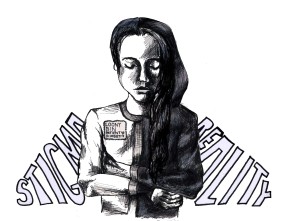
We all get lonely. There’s no shame in that.
Sometimes you get blue and you can’t explain it or figure out why you are feeling like you do. Sometimes you get blue and you are simply lost in that emotion. It comes from left field and sucker punches you right in the gut, leaving you unable to go out and enjoy the things you know or used to enjoy.
Approximately 44 percent of college students in the United States admit to having feelings of depression, yet over two-thirds don’t talk about it or seek any help, according to PsychCentral.com, an online mental health website. In fact, suicide is the second leading cause of death among college-aged students, according to the Suicide Prevention Resource Center.
It seems that no one wants to talk about depression.
It’s a conversation where no one really knows the right thing to say, or how to start talking, because there’s a silent stigma surrounding mental health. It’s a stigma that is detrimental to helping those who really need it.
This is evident whenever mental health issues get brought up.
While I was watching TV with my friends recently, a mental health commercial came on. The commercial shows a dad getting groceries out of the back of the car. He turns to his kids and says how he thinks the family would be better off without him. The conversation my friends and I were having ended. Everyone was watching the commercial. Only once it was over did anyone feel like they could speak. The first thing anyone said was, “Well, that got real.” Everyone felt awkward. It was uncomfortable.
Depression can be difficult to discuss, especially for those who are suffering from it. It’s a coming-out of sorts because you can’t tell how people will react. You don’t want to be a burden. You don’t want people to treat you differently, like you’re sick and they have to walk on eggshells around you or treat you with an exceptional amount of gratitude. It’s something you keep to yourself because something deep inside you tells you that no one really cares and it doesn’t matter. It’s a vicious cycle of thoughts that tear you apart and make you feel empty.
I know this because I have fallen victim to these thoughts in the past.
It’s not something I prefer to talk about, and it’s more easily swept under the rug. But the whole problem with mental health is that no one wants to talk about it. The least I could do to help stop the stigma is talk about my own issues.
A giant misconception about depression is that it is derived from some horrifying event in a person’s past. Nothing scarring happened to me. I had a perfectly swell childhood. I have the most nurturing family that supported my every exploration with open arms and loving smiles. Sometimes, for seemingly no reason, the weight of the world seems too much to bear. This causes a slew of upsetting thoughts, and the only solution seems to be taking a nap for as long as your body will physically allow you to sleep. When I wake up, I normally feel balanced again. I continue without anyone even noticing a misstep in emotion.
It’s easy to fall into the mindset that you are the only one feeling this way, that you are the only one hurting. That is so painfully far from the truth. The reason you think you are alone is because no one wants to talk about it. Few people are willing to put aside the awkwardness and recognize their own problem.
The stigma around mental health is preventing people from getting help, and I’m not okay with that.
I know it can be hard to start a conversation about your own issues. Trust me, I can perfectly relate to that. But realize it’s imperative to your health that you confront the problem. If you had an infection in your leg and you realized the problem was only getting worse and spreading, I can only hope that you’d put aside your discomfort and get help. The same is true for mental health. Prolonged suffering only leads to the problem growing bigger and getting worse.
Find someone to confide in. Make it your roommate, girlfriend, coworker, mom, whoever. It doesn’t matter who you talk to as long as you don’t let yourself fight the battle alone.
If you notice a friend withdrawing from the world, confront the issue. Maybe they are sleeping all day or not sleeping at all. Perhaps they’re not eating or over-eating. If they seem to always be distracted or have difficulty concentrating or remembering information, talk to them about it. Invite them on a walk through Bidwell Park. I can almost guarantee they will hesitate, but it is crucial that you stay persistent. Offer your support. Show yourself as someone who cares, and who can be trusted. You have no idea the impact a good, caring friend can make in someone’s life.
Whether it’s because you just failed an important exam or a family member passed away, or maybe it’s for no reason at all, know that feelings of depression will hit you at some point in your life. Don’t let the fear of judgment prevent you from seeking help. Speak up for mental health and stop the stigma.
Amanda Irons can be reached at airons@theorion.com or @Orion_opinion on Twitter.
Illustration by Liz Coffee.




